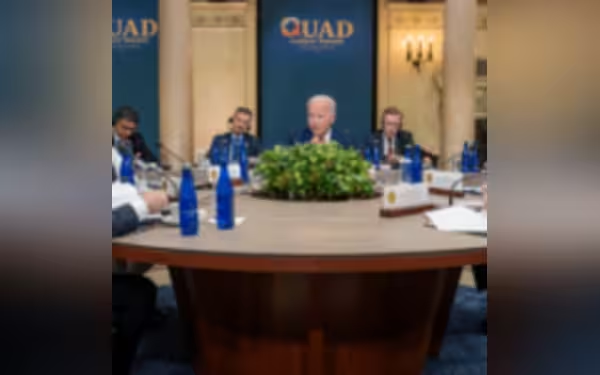Sunday, December 22, 2024 03:39 PM
QUAD Alliance: A Strategic Response to China's Influence in the Indo-Pacific
- QUAD aims to counterbalance China's growing influence.
- Leaders emphasize economic ties and defense cooperation.
- India's role is crucial amid territorial disputes with China.
 Image Credits: pakistantoday
Image Credits: pakistantodayThe QUAD alliance focuses on regional stability and countering China's influence in the Indo-Pacific through economic and defense cooperation.
The geopolitical landscape of the Indo-Pacific region is undergoing significant changes, particularly with the rise of China as a dominant power. In response to this shift, nations like India, the USA, Japan, and Australia have come together to form the Quadrilateral Security Dialogue, commonly known as QUAD. This alliance aims to foster regional stability and counterbalance China's growing influence. Established in 2007, QUAD has evolved from a dialogue into a more structured partnership, with its recent summit in Wilmington, Delaware, highlighting the commitment of its members to a free and open Indo-Pacific.
At the heart of QUAD's formation is the need for strategic security in a region that is increasingly becoming a focal point for global power dynamics. The first virtual summit in March 2021 set the stage for collaboration on various issues, including climate change, health challenges, and technological advancements. The recent summit, held on September 21, 2023, marked a significant step forward, as leaders from the USA, Japan, Australia, and India convened to discuss a wide range of topics aimed at enhancing cooperation and ensuring peace in the region.
During the summit, the leaders reaffirmed their commitment to maintaining a free and open Indo-Pacific, while also addressing pressing global challenges. They discussed enhancing maritime security, preparing for natural disasters, and investing in cutting-edge technologies. Notably, the emphasis was placed on strengthening economic ties and defense cooperation, although the leaders were cautious not to explicitly mention military alliances. This careful wording suggests a desire to maintain a focus on strategic dialogue and shared values, rather than overt military posturing.
India's role in QUAD is particularly noteworthy. Despite being a developing nation with economic and military capabilities that do not yet match those of its counterparts, India has emerged as a key player in the alliance. Its long-standing territorial disputes with China make it a natural ally for countries seeking to curb China's influence. The USA and its allies have pledged support to India in these disputes, further solidifying its position within QUAD.
Moreover, the summit revealed plans for increased economic cooperation among QUAD members. The upcoming meeting of QUAD Commerce and Industry Ministers aims to foster mutual trade and enhance industrial ties, reflecting a long-term strategy to create deeper economic interdependencies. This approach is seen as a buffer against potential conflicts, as stronger economic ties can lead to greater stability.
While the official language of the QUAD summit emphasized peace and cooperation, analysts suggest that the underlying goal is to contain China's growing influence. The timing of the summit is particularly significant, given the rising global tensions, including the ongoing Russia-Ukraine war and recent escalations in the Middle East. Interestingly, the brutal attack on Lebanon by Israel, which resulted in significant civilian casualties, was not mentioned during the summit, raising questions about the QUAD's focus on broader global crises.
The QUAD alliance represents a strategic effort to promote regional security and stability in the Indo-Pacific. While the official statements from the summit highlight cooperation and shared prosperity, it is evident that the alliance is also positioning itself as a counterweight to China's influence. As the geopolitical landscape continues to evolve, the role of QUAD and its members will be crucial in shaping the future of the region. The ongoing collaboration among these nations not only aims to address immediate challenges but also seeks to establish a framework for long-term peace and stability in a rapidly changing world.













